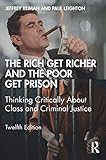The Rich Get Richer and the Poor Get Prison : Thinking Critically About Class and Criminal Justice / Jeffrey Reiman and Paul Leighton
Material type: TextPublication details: New York Routledge 2020Edition: 12th EdDescription: xxi, 260p. : ill. ; 23cmISBN:
TextPublication details: New York Routledge 2020Edition: 12th EdDescription: xxi, 260p. : ill. ; 23cmISBN: - 9780367231798
- 23rd Ed. 364.973 REI
| Item type | Current library | Collection | Call number | Copy number | Status | Notes | Date due | Barcode | |
|---|---|---|---|---|---|---|---|---|---|
| Reference Book | VIT AP School of Law LAW Section | Reference | 364.973 REI (Browse shelf(Opens below)) | LA01571 | Not for loan | LAW | 020423 |
Browsing VIT AP School of Law shelves, Shelving location: LAW Section, Collection: Reference Close shelf browser (Hides shelf browser)
It includes Index Pages.
Description:
For 40 years, this classic text has taken the issue of economic inequality seriously and asked: Why are our prisons filled with the poor? Why aren’t the tools of the criminal justice system being used to protect Americans from predatory business practices and to punish well-off people who cause widespread harm?
This new edition continues to engage readers in important exercises of critical thinking: Why has the U.S. relied so heavily on tough crime policies despite evidence of their limited effectiveness, and how much of the decline in crime rates can be attributed to them? Why does the U.S. have such a high crime rate compared to other developed nations, and what could we do about it? Are the morally blameworthy harms of the rich and poor equally translated into criminal laws that protect the public from harms on the streets and harms from the suites? How much class bias is present in the criminal justice system – both when the rich and poor engage in the same act, and when the rich use their leadership of corporations to perpetrate mass victimization?
The Rich Get Richer shows readers that much of what goes on in the criminal justice system violates citizens’ sense of basic fairness. It presents extensive evidence from mainstream data that the criminal justice system does not function in the way it says it does nor in the way that readers believe it should. The authors develop a theoretical perspective from which readers might understand these failures and evaluate them morally—and they to do it in a short text written in plain language.
Readers who are not convinced about the larger theoretical perspective will still have engaged in extensive critical thinking to identify their own taken-for-granted assumptions about crime and criminal justice, as well as uncover the effects of power on social practices. This engagement helps readers develop their own worldview.
New to this edition:
Presents recent data comparing the harms due to criminal activity with the harms of dangerous—but not criminal—corporate actions
Updates statistics on crime, victimization, incarceration, wealth, and discrimination
Increased material for thinking critically about criminal justice and criminology
Increased discussion of the criminality of middle- and upper-class youth
Increased coverage of role of criminal justice fines and fees in generating revenue for government, and how algorithms reproduce class bias while seeming objective
Streamlined and condensed prose for greater clarity
Table of Contents:
Introduction: Criminal Justice Through the Looking Glass, or Winning by Losing
1. Crime Control in America: Nothing Succeeds Like Failure
2. A Crime by Any Other Name …
3. ... And the Poor Get Prison
4. To the Vanquished Belong the Spoils: Who Is Winning the Losing War Against Crime?
Conclusion: Criminal Justice or Criminal Justice
Appendix I: The Marxian Critique of Criminal Justice
Appendix II: Between Philosophy and Criminology
There are no comments on this title.








